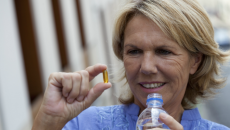Clinical Definition
Antioxidants are naturally occurring agents that prevent cellular oxidation, and may protect the body from molecules that damage cells (called free radicals). Common dietary antioxidants include vitamins A, C and E.
In Our Own Words
Antioxidants are natural or synthetic substances found in foods that may protect cells from the damaging effects of free radicals, which are thought to play a role in aging, heart disease, cancer and other conditions. Free radicals are created when the body synthezises food into energy and toxic external sources — such cigarette smoke, air pollution and sun exposure — introduce free radicals into the body. Antioxidants may supply electrons that deactivate free radicals, possibly preventing their damaging and aging effects. (Good reasons to eat more fruits and veggies.)
Symptoms and Side Effects
- Vitamins A, C, E
- Selenium
- Beta carotene
